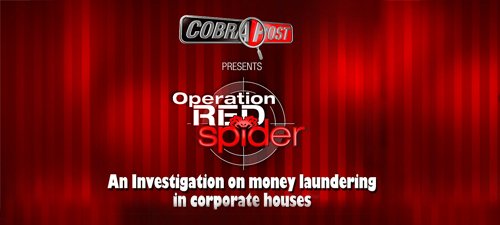Central Bank of India, Case 1, S. K. Garg, Chief Manager, South Delhi
A gentleman and an able manipulator, with experience and high-profile contacts, he has the ability to swing deals. Among many ways he suggests, the most daring is get someone who could issue a cheque against all your black money and show it as unsecured loan: “Aisa koi reliable banda ho … main aapko number do … jo aap usse cheque lete … aap usko cash de sakte … usmein kya hota hai ki unsecured loan karke daala jata hai … unsecured loan show kar denge … aapka cheque aa jayega … lekin samne wala banda kabhi bhi paisa maang sakta hai (There could be a reliable person … who maybe looking for number two money … you can take a cheque from him … give him the cash … what happens here is that it is shown as an unsecured loan … you will receive your cheque … the flip side is that this man can ask for his money back any time).”
The Cobrapost journalist walks into this branch of Central Bank of India somewhere in South Delhi and meets Chief Manager S. K. Garg. As soon as he is settled, he rattles it of: A minister intends to invest a big amount in some long-term scheme with good returns but with no TDS.
The chief manager takes a brief break from his work, and turning to our reporter asks: “Kitna (How much)?”
Rs. 1 crore for now, says our reporter, and the rest – about Rs. 8–10 crore – is expected in some months.
This prepares the ground for discussion on our proposition, as the soft-spoken manager says we could invest Rs. 1 crore in a scheme of the bank that gives a maximum 9.25 per cent interest. So far so good.
We get into the groove, asking if there are some right long-term, for about 10 years, insurance policies available with his bank.
Yes, the manager says.
But our money should not be visible, we tell him for obvious reasons.
Without batting an eyelid, the senior banker suggests Bima Bachat, a single premium investment plan designed by the LIC of India for high-net worth individuals. We come to know the Central Bank of India has a tie-up with the government insurer LIC of India.
After Garg has explained the plan in detail, we show interest in an instrument with a 12-year-long period. But there is a rider: In no case should the minister’s name be disclosed. That is why the money has to be invested in his wife’s name.
Garg asks: “Cheque se ayega na (It [the premium] will be paid by cheque, won’t it)?”
No, it is all in cash. The reporter makes it clear.
That’s when the manager’s eyebrows shoot up: “Ek crore cash mein kahan se karoge?… Cash mein fir PAN number wagaireh ayega saara (How will you do it Rs. 1 crore in cash? In cash [transaction] PAN etc. will all come into play).”
So the PAN will be disclosed? Our reporter shifts in his seat.
The manager realises some explanations are in order, takes off his glasses and sits back. “Meri baat suniye … aisa hai … dekhiye main aapko sahi bataoonga … dus lakh se upar ki agar aapki cash entry jaati wo automatic pick up karega (Listen to me … this is like … see, I will tell you a right thing … if there is a cash entry of more than Rs. 10 lakh, it is automatically picked up).”
Shall we then deposit Rs. 9 lakh in our accounts? Our reporter asks.
The banker continues to explain: “Account mein nine lakhs cash ekdum nahin aane ka … saal ki baat kar raha hoon main (Rs. 9 lakh should not be posted in the account … I am talking about in a year).”
We suggest the LIC route again, and the manager goes back to the single-premium LIC policy.
Then, an idea strikes him: “Ek kaam karo na … kisise aap cheque le lo na (Why don’t you do one thing … take a cheque from someone).”
We say this is not possible.
He thinks hard and then starts asking all the right questions: “Aapne kya kiya? Property bechi (What did you do? Sold a property)?”
No, it is hard cash coming to the minister. We say that much.
He asks again: “Sub cash mein hi ayega sara (All will come in cash)?” Another bout of hard thinking before he says: “Kuch bhi cheque se nahin ayega (Nothing will come by cheque)?”
We relent a bit and tell him we would pay 20 per cent by cheque.
Garg suggests more options: “Main aapko ek cheez sahi bata deta hoon … jo LIC karwani hai wo toh cheque se karwaiye … aur baaki jo main aapko jo hai … ya toh alag alag bank pe jo hai … pachaas pachaas hazar rupaye ki DD bana dijiye … naam mein jismein bhi account aap kholte hain … baad mein wo clearing mein daal ke … wo jama ho jayega (Let me tell you one thing … do the LIC [policy] by cheque … and with the rest of the cash … get several DDs for Rs. 50,000 each from other banks in the names you will open the accounts here … later on you can put them all into clearing … that [money] will be credited [in those accounts]).”
He further says that if we did cash transaction of more than Rs. 50,000, we would require to submit PAN, and if our transaction crosses Rs. 10 lakh, it automatically goes into reporting.
We suggest we would deposit Rs. 7–8 lakh a year in each of the accounts.
“Koi problem nahin (There is no problem),” assures the manager.
Okay, so we will open six-seven accounts.
However, our manager warns that to open accounts “proper KYC norms” should be followed.
When we talk about returns, our manager takes out an envelope, and in true back-of-the-envelope style, gives the details. He goes on to assure us: “Ye toh cheque se aayega saara white hoke (All this will come by cheques, converted into white).” And there would be no TDS.
He is a busy manager, and in between he receives a call and shows it off a little, informing that it was a call from the PS in the Finance Ministry.
He details more ways: “Usme ek cheez hai ki alag alag branch ki policy se jo hai na jo alag alag draft banake alag alag policy hai na … usmein pachaas pachaas hazaar jo hai … use bhi alag alag ban jaati hai (There is one thing that you can get policies from different branches … you can make [demand] drafts for Rs. 50,000 each and buy separate policies with them).”
When suggested that a ‘meeting’ could be arranged in the evening, the manager eagerly nods. Meet who? We say he could meet the minister’s wife.
Through with ‘investment’ proposals, we now bring in the subject of lockers for cash.
The manager is helpful: “Lockers yahan nahin hai … main doosri jageh karwa deta hoon (There are no lockers here … I will arrange lockers elsewhere).”
We say we would require lockers for the big cash that is expected in March.
Our manager starts working on the phone, to find out if lockers, and if large lockers, are available with other branches of his bank. But his inquiries don’t help.
How long has he been in this branch, we ask, and do clients such as us come to him in numbers?
Nearly two years, he says, and, yes, many such clients do come to him. He rings up another banker, one Mr Ghosal, and asks if two small lockers are available with his branch.
This branch with lockers would surely have counting machines to count the cash.
The manager is quick to strike a note of caution: “Na … aisa count mat kara karo … aisa hota hai ki locker ki content hami nahin maloom hone chahiye … ye cheeze count nahin hoti (No, do not count like that … we are not supposed to know the contents of the lockers … these things are not counted).”
Our reporter asks if such LIC policies are safe. Our manager starts ringing again: “LIC walon ko bhi hamhein confidence mein lena parega (We will have to take the LIC people into confidence also).”
He makes a call: “Namaskar … Nirmal’ji … yaar tum meri help koro … panch che policy chahiye cash mein chaar chaar paanch paanch lakh ki … kaise karaoge? Abhi kahan ho aap? Aap aa sakte ho dus minuite me? Party ka … representative baithe hue hain … samne baithke discuss karwake final (Namaskar Nirmal’ji … help me out friend … five-six policies are needed, in cash, for Rs. 4 and Rs 5 lakh each … how will you do it? Where are you now? Can you come in 10 minutes? The representative of the client is sitting with me … let us discuss one-to-one and finalise it).”
The person he spoke with is working as a branch manager with LIC at its Connaught Circus office and looks after the insurance business of his branch.
A 15-minute wait. The manager invites our reporter out for a smoke, and it turns out to be a revealing experience.
On the way, he reveals his secret: “Customer koi bhi mere se naraz ho ke nahin jate (No customer goes back dissatisfied from me).”
Our reporter tells the manager a story about how a large amount of the minister’s money has been stuck with a builder and a compromise is being reached after some arm-twisting. Chuckles the manager: “Ram Gopal Varma hai (like Ram Gopal Verma).”
On the greedier side, he says: “Inki accounts bhi waisi bhi khulwa do na kya (Why don’t you get him to open his account here as well).”
We remind him that only the wife’s name will come.
We ask him whether any information would be disclosed.
He reassures us: “Aisa hai ki jo meri cheezein … mere tak rehti hain (There is one thing … whatever I do, I keep it to myself).”
More prodding sees the bank manager unhappy with official strictures. “Is samay Finance Minister aur Reserve Bank bahut jyada woh hai (These days, the Finance Minister and the Reserve Bank are very much … (tough)].”
Then he repeats his idea in clear terms: “Aisa koi reliable banda ho … main aapko number do … jo aap usse cheque lete … aap usko cash de sakte … usmein kya hota hai ki unsecured loan karke daala jata hai … unsecured loan show kar denge … aapka cheque aa jayega … lekin samne wala banda kabhi bhi paisa maang sakta hai (There could be a reliable person … who maybe looking for number two money … you can take a cheque from him … give him the cash … what happens here is that it is shown as an unsecured loan … you will receive your cheque … the flip side is that this man can ask for his money back any time).”
What the banker is suggesting is that we can make our money white
Discussions end with the reporter and the manager agreeing that such a “reliable” man is difficult to get.




























